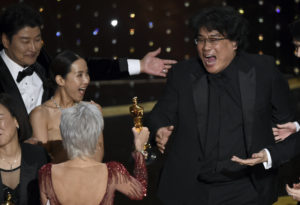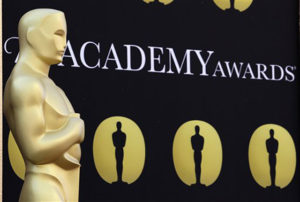Golden Globes: A Contender for Best Comedy
The scandal-plagued awards show gets a nod for spotting groundbreakers, but the back-scratching nature of the ceremony makes it a little hard to swallow. Ricky Gervais arrives at the 73rd annual Golden Globe Awards in Beverly Hills, Calif. (Jordan Strauss / Invision / AP)
Ricky Gervais arrives at the 73rd annual Golden Globe Awards in Beverly Hills, Calif. (Jordan Strauss / Invision / AP)
Sunday night the Hollywood Foreign Press Association (HFPA), described by host Ricky Gervais as a group that confers awards to enable its members to take “selfies with stars,” announced the winners of the 73rd annual Golden Globes.
“The Revenant” took the prize for film drama, best director and best actor in a drama (Leonardo DiCaprio). “The Martian” won best comedy and best actor in a comedy (Matt Damon). “Inside/Out” won the prize for animated film, “Mr. Robot” was named top television drama, “Mozart in the Jungle” best television comedy and “Wolf Hall” best limited television series.
Remember this when discussing the Golden Globes: More people (500) voted for class clown in my year at North Hollywood High than HPFAers (90) voted for the winners of Sunday night’s statuettes.
It says something, although I’m not sure exactly what, that even the Globes’ severest critics have grudging admiration for this group, which has weathered perennial charges of corruption, credentials scandals and even a Federal Communications Commission investigation. In his monologue, Gervais noted the unlikelihood of stars staying away from the Golden Globes—“especially if their studio has already paid for them.” (After that crack, the camera cut to mogul Harvey Weinstein, whose movies do very well at the Globes.)
A lifetime Globes skeptic, I wrote a decade ago that there were three reasons why the GGs exist: (1) because Hollywood is an awards-addicted town; (2) because the Globes serve the movie industry by effectively naming Oscar front-runners; and (3) because, given hosts such as Gervais, Tina Fey and Amy Poehler, the Globes broadcast is more roast than awards show and thus better television. And I would say that again today.
Yet after years of calling the Globes Hollywood’s most blatant mutual back-scratching arrangement—studios give access to journalists in exchange for those scribes giving awards to studio product—I am willing to concede that the HFPA does two things right. (1) It has recognized both progressive and mold-breaking television earlier than the Emmys, as has been the case with “Transparent,” “Mad Men,” “Glee” and “The Sopranos.” (Given Sunday’s win for “Mozart in the Jungle,” an Amazon production, as best TV comedy, the GGs continue that tradition of early support.) And (2) it gives awards for best drama and comedy in both the movie and TV categories. (The Oscars pit drama against comedy, and despite exceptions such as “It Happened One Night,” “Annie Hall” and “Shakespeare in Love,” drama almost inevitably wins.)
Still, for most Hollywood observers over 40 years old, the GGs continue to be a joke. Denzel Washington, this year’s recipient of the HFPA’s Cecil B. DeMille Award, received the prize from his “Philadelphia” co-star Tom Hanks and a standing O from the audience. Washington implied that his first Golden Globe win, in 1990 for “Glory,” may have been prearranged. Freddie Fields, the film’s producer, told him to get dressed up and go to the HFPA dinner “because I was going to win. And I did.”
Similarly, Robert De Niro, the 2011 DeMille winner, summed it up: “The important thing is we’re all in this together—both the filmmakers who make the movies, and the members of the Hollywood Foreign Press who, in turn, pose for pictures with the movie stars.”
Admittedly, many under 50 may not be old enough to remember the history of HFPA embarrassments. There was 1958, the year the GGs made explicit that only celebrities who showed up would win a statuette. How else to explain why that year Zsa Zsa Gabor won the prize as “Most Glamorous Actress”—as if that were an artistic achievement? A decade later, the FCC, citing “highly irregular voting procedures,” reprimanded NBC for broadcasting the event. The scandal did not tarnish the Globes. Nor did its coronation of Pia Zadora as “Most Promising Newcomer” after her husband flew the HPFA membership to Las Vegas to see her movie “Butterfly.” Nor did a 1981 investigation by the Los Angeles Times that found that some HFPA members did not represent publications for which they claimed to write.
Have those who laugh the loudest at the Globes—and I, oh Lord, am one—inadvertently colluded in transforming the event into the second-most important awards show in the film industry? Yes, because we’ve given them publicity, and that’s what people remember.
Sunday night, Gervais’ barbs elicited more wincing than laughter. He introduced Matt Damon, “The Martian” star, as “the only person Ben Affleck hasn’t been unfaithful to.” Yet when he introduced two television stars, he made the most pointed political comment of the day. “Eva Longoria and America Ferrera are two beautiful actresses who Donald Trump can’t wait to deport.” Such jokes illustrate the mixed bag that is the Golden Globes.
Gervais snarked at the top of the show, “I’m gonna do this monologue and go into hiding—not even Sean Penn will find me.” I hope he keeps his promise.
Major awards:
“Steve Jobs” (two awards): Kate Winslet, best supporting actress in a film; Aaron Sorkin, best screenwriter
“Joy”: Jennifer Lawrence, best actress in a film comedy
“Room”: Brie Larson, best actress in a film drama
“The Martian” (two awards): best film comedy; Matt Damon, best actor in a film comedy
“Creed”: Sylvester Stallone, best supporting actor in a film
“The Revenant” (three awards): best film drama; Alejandro G. Inarritu, best director of a film drama; Leonardo DiCaprio, best actor in a film drama
“Inside/Out”: best animated film
“Mr. Robot” (two awards): best television drama; Christian Slater, best television supporting actor
“Mad Men”: Jon Hamm, best actor in a television drama
“Empire”: Taraji P. Henson, best actress in a television drama
“Wolf Hall”: Best limited television series
“Show Me a Hero”: Oscar Isaac, best actor limited television series
“Mozart in the Jungle” (two awards): best television comedy; Gael Garcia Bernal, best actor in a television comedy
“Crazy Ex-Girlfriend”: Rachel Bloom, best actress in a television comedy
“The Affair”: Maura Tierney, best supporting actress
“Son of Saul”: Best foreign-language film
Your support is crucial...As we navigate an uncertain 2025, with a new administration questioning press freedoms, the risks are clear: our ability to report freely is under threat.
Your tax-deductible donation enables us to dig deeper, delivering fearless investigative reporting and analysis that exposes the reality beneath the headlines — without compromise.
Now is the time to take action. Stand with our courageous journalists. Donate today to protect a free press, uphold democracy and uncover the stories that need to be told.






You need to be a supporter to comment.
There are currently no responses to this article.
Be the first to respond.